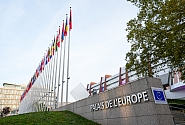
On Monday, 27 January, the Parliamentary Assembly of the Council of Europe (hereinafter – the Assembly) has challenged the credentials of the Georgian delegation and requested the Assembly’s Monitoring Committee to prepare an urgent report on the situation in Georgia following an opinion of over 30 Assembly members that the developments in Georgia undermine its democracy. Zanda Kalniņa-Lukaševica, Chair of the Monitoring Committee and Deputy Speaker of the Saeima, indicates that the report is scheduled for discussion on Wednesday, 29 January, at the Assembly plenary session, where the framework for PACE’s future cooperation with the Georgian delegation will also be decided.
At the regular session of the Assembly on Monday, Kalniņa-Lukaševica presented the Monitoring Committee’s 2024 report. It reflects the main events and the progress made in terms of respect for democracy, the rule of law, and human rights in the Council of Europe member states.
“Today, more than ever before, we must not only have discussions, but also take active steps towards strengthening democracy, human rights, and the rule of law. Last year, the Monitoring Committee paid close attention to the developments in Georgia, Moldova, Azerbaijan, and Bulgaria. Our work is a testimony to Europe’s promise of defending and strengthening democratic values,” highlighted Kalniņa-Lukaševica.
In her address, she stated that 2024 had been full of challenges, emphasising in particular the dramatic deterioration in Georgia. Therefore, this year the Assembly is organising a separate discussion on this country, which will take place on 29 January.
In 2024, the Assembly’s Monitoring Committee also assessed the situation in Moldova, where the previous year’s elections and the pre-election period in particular uncovered Russia’s growing attempts to interfere in the country’s internal affairs and electoral process. Such methods of interference as disinformation campaigns, economic pressure, and organising initiated protests, among others, illuminate the threat that Moldova’s electoral processes may face in the upcoming parliamentary elections this year.
Nevertheless, positive trends have also been observed in 2024 regarding the fulfilment of obligations assumed by the states as verified by the Monitoring Committee. For instance, significant progress has been made in Albania. In its report, the Committee expresses hope that Albania’s path of improvement will continue.
The Parliamentary Assembly of the Council of Europe (PACE) is the parliamentary dimension of the Council of Europe and one of its largest and most visible institutions. The PACE closely follows the political processes in Europe, and its actions are directed towards the upholding of the fundamental values and standards of the Council of Europe. The main objective of the PACE is to strengthen the parliaments of its member states, promote and protect human rights, the rule of law, and democratic governance in all European countries, and share its experience of democracy with the parliaments of the organisation’s partners and observers. Founded in 1949, the Parliamentary Assembly of the Council of Europe currently brings together 46 European countries. There are six MPs in the Latvian delegation to the PACE headed by Zanda Kalniņa-Lukaševica, Deputy Speaker of the Saeima.
Saeima Press Service









